Select Works of Cosmo Lang (5 vols.)
Digital Logos Edition
This product has been transferred from Community Pricing to Pre-Pub. The actual funding level may be lower than it appears, which could delay production. The amount of funding still needed will be evaluated and updated soon.
Overview
Cosmo Lang was Archbishop of Canterbury for 15 years (1928–1942), holding the office longer than any other twentieth-century Archbishop. His legacy is somewhat scattered, lacking a cohesive direction. He was a talented orator and administrator, who ably handled problems, but his solutions lacked a unified vision. In his early career he was heavily involved with helping the poor, supporting the controversial liberal 1909 “people’s budget,” but upon his elevation to Archbishop of Canterbury he detached himself from lower society and everyday life. The Select Works of Cosmo Lang collects many of his early writings and sermons, including The Miracles of Jesus and The Parables of Jesus—Lang’s own exegesis and application of the Gospel texts, his lectures on The Opportunity of the Church of England and The Unity of the Church of England, and The Principles of Religious Education. This collection provides an excellent overview of the perspective and politics of the early twentieth-century Anglican Church.
In the Logos editions, these valuable volumes are enhanced by amazing functionality. Scripture citations link directly to English translations, and important terms link to dictionaries, encyclopedias, and a wealth of other resources in your digital library. Perform powerful searches to find exactly what you’re looking for. Take the discussion with you using tablet and mobile apps. With Logos Bible Software, the most efficient and comprehensive research tools are in one place, so you get the most out of your study.
Key Features
- Cosmo Lang’s exegesis and application of the Gospels
- Inisght into early twentieth-century Church politics
- Selected works from the twentieth-century’s longest serving Archbishop of Canterbury
Product Details
- Title: Select Works of Cosmo Lang
- Author: Cosmo Lang
- Publishers: Longmans, Green, and Co.; S. P. C. K.; E. P. Dutton and Company
- Volumes: 5
- Pages: 878
Individual Titles
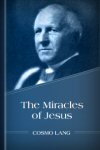
This volume contains Cosmo Lang’s teaching on the Gospels, The Miracles of Jesus.
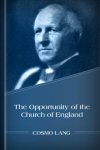
This volume contains Cosmo Lang’s lectures delivered in Cambridge Divinity School in 1904, The Opportunity of the Church of England.
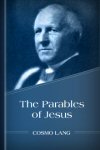
The Parables of Jesus
- Author: Cosmo Lang
- Edition: New American Edition
- Publisher: E. P. Dutton & Company
- Publication Date: 1918
- Pages: 300
This volume contains Cosmo Lang’s teaching on the Gospels, The Parables of Jesus.
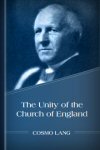
The Unity of the Church of England
- Author: Cosmo Lang
- Publisher: S. P. C. K.
- Publication Date: 1925
- Pages: 16
This volume contains Cosmo Lang’s, The Unity of the Church of England.
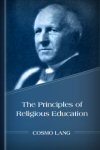
The Principles of Religious Education
- Author: Cosmo Lang
- Publisher: Longmans, Green, and Co.
- Publication Date: 1906
- Pages: 40
This volume contains three sermons Cosmo Lang preached in St. Paul’s Cathedral in February 1906, The Principles of Religious Education.
About Cosmo Lang
Cosmo Lang (1864–1945) was a Scottish Anglican prelate, serving as Archbishop of York from 1908 to 1928 and Archbishop of Canterbury from 1928 to 1942. He was elevated to Archbishop of York just 18 years after his ordination, a relative youth. During his early ministry he served in the slum parishes of Leeds and Portsmouth. Early on in his tenure as Archbishop of York he was considered somewhat of a radical, supporting the 1909 “people’s budget,” but in later years he distanced himself from such causes. He became close with the royal family and was created a Knight Grand Cross of the Royal Victorian Order by George VI. He retired in 1942, after serving for 15 years as head of the Church.